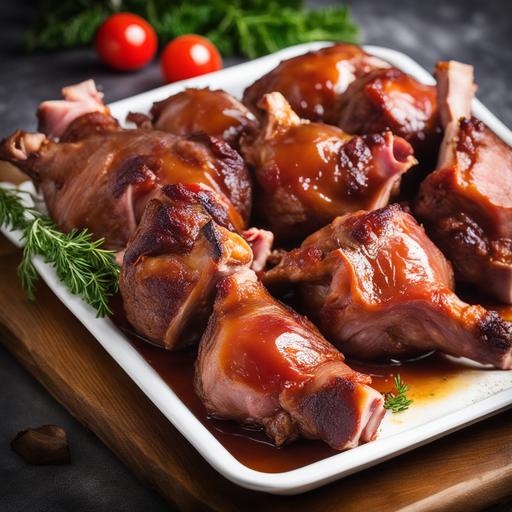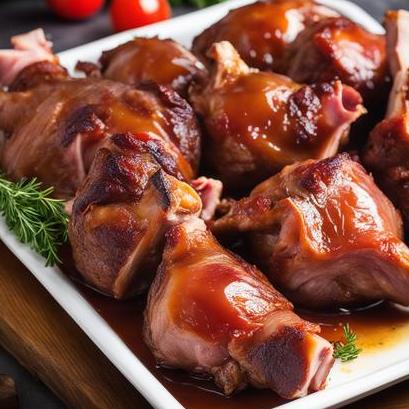
Smoked Pork Hocks Oven Recipe: A Comprehensive Guide
Are you a pork lover? If yes, then smoked pork hocks oven recipe is the perfect meal for you. Smoked pork hocks are tender, juicy, and flavorful. This recipe is not only delicious but also easy to make, and it is perfect for any day of the week.
In this guide, we will cover everything you need to know about smoked pork hocks. We will talk about the food science behind it, how to select and clean pork hocks, preparation, tips, variations, doneness checks, and a yummy recipe.
Food Science of Smoked Pork Hocks
Pork hocks, also known as pork shanks, are the upper part of the pig’s leg. They are a tough cut of meat that requires long, slow cooking to become tender. Smoking the pork hocks amplifies the flavor of the meat and makes it more tender.
Smoking is the process of adding flavor to food by exposing it to smoke from burning wood. Smoking meat has been around for centuries and is a common method of cooking in many cultures. The smoke from the wood adds flavor to the meat and preserves it, making it last longer.
The smoke contains chemicals that react with the meat, creating new compounds that add flavor and color. Smoke also coats the meat, helping to seal in moisture. This allows the pork hocks to cook slowly and become tender without losing their moisture.
Selection and Cleaning of Pork Hocks
When selecting pork hocks, look for ones with a good amount of meat on them. The meat should be pink and not gray. The skin on the pork hock should look smooth and not have any discolorations or bruises. If there is any odor coming from the pork hocks, it is not fresh and should be avoided.
Cleaning pork hocks is an essential step to remove any bacteria or dirt that may be on them. Rinse the pork hocks thoroughly with running water and pat them dry with a paper towel.
Preparation

There are three main steps to preparing smoked pork hocks; seasoning, smoking, and cooking.
Seasoning
To season pork hocks, you can use a dry rub or a marinade. Both options add flavor to the meat.
For a dry rub, mix salt, black pepper, paprika, brown sugar, and garlic powder in a bowl. Rub this mixture into the pork hocks, ensuring that it is evenly coated.
For a marinade, mix soy sauce, Worcestershire sauce, grated ginger, garlic, and sugar in a bowl. Place the pork hocks in the marinade and let them sit in the refrigerator for at least four hours or overnight.
Smoking
To smoke pork hocks, you will need a smoker. A smoker is a specialized cooking device that uses wood chips to create smoke. The smoke circulates around the meat, adding flavor and tenderizing it.
There are many different types of smokers available, from electric to charcoal. The type of smoker you use will depend on your personal preference and budget.
To smoke pork hocks, preheat your smoker to 225°F. Place the pork hocks on the smoker rack and close the lid. Smoke the pork hocks for three hours, adding more wood chips as necessary.
Cooking
After smoking the pork hocks, it’s time to cook them. Preheat your oven to 300°F. Place the smoked pork hocks on a baking dish, and cover them with aluminum foil. Bake the pork hocks for three hours, checking to make sure they are tender.
Tips and Variations
Here are some tips and variations to help you create the perfect smoked pork hocks:
- If you like a sweet and salty flavor, add honey to your marinade.
- For a spicier flavor, add cayenne pepper or chili powder to your dry rub.
- You can use apple, hickory, or mesquite wood chips for smoking.
- To make a crispy skin, remove the pork hocks from the foil during the last thirty minutes of cooking.
- Leftover smoked pork hocks can be added to soups, stews, and sandwiches.
Doneness Checks

It’s essential to check the doneness of smoked pork hocks. Overcooking or undercooking can make the meat tough or dry. To check the doneness, use a meat thermometer. The internal temperature of the pork hock should be between 190°F and 200°F.
Recipe
Here is a recipe to get started with smoked pork hocks:
Ingredients:
- 4 pork hocks
- 1 tablespoon salt
- 1 tablespoon black pepper
- 1 tablespoon paprika
- 1 tablespoon brown sugar
- 1 tablespoon garlic powder
- 1 cup soy sauce
- ½ cup Worcestershire sauce
- 1 tablespoon grated ginger
- 1 tablespoon minced garlic
- 2 tablespoons sugar
Directions:
- Rinse the pork hocks with running water and pat them dry with a paper towel.
- In a bowl, mix salt, black pepper, paprika, brown sugar, and garlic powder.
- Rub the dry rub mixture onto the pork hocks, ensuring that they are evenly coated.
- In another bowl, mix soy sauce, Worcestershire sauce, grated ginger, minced garlic, and sugar.
- Place the pork hocks in the marinade and let them sit in the refrigerator for at least four hours or overnight.
- Preheat the smoker to 225°F. Place the pork hocks on a smoker rack and smoke them for three hours, adding more wood chips as necessary.
- Preheat the oven to 300°F. Place the smoked pork hocks on a baking dish and cover them with aluminum foil. Bake the pork hocks for three hours, checking to make sure they are tender.
- Remove the pork hocks from the oven and let them cool for five minutes. Serve hot and enjoy!
Overcooking and Undercooking
Overcooking or undercooking smoked pork hocks can ruin the dish. Overcooking can make the meat dry, while undercooking can leave it tough and chewy.
To prevent overcooking, make sure to check the temperature of the pork hocks regularly. If they are done before the three hours of cooking time, remove them from the oven to prevent them from overcooking.
To prevent undercooking, make sure to cook the pork hocks for the full three hours at 300°F. Checking the internal temperature of the pork hocks regularly will help you ensure that they are cooked to perfection.
Conclusion
Smoked pork hocks oven recipe is a delicious and easy-to-make meal that is perfect for any day of the week. By following the steps outlined in this guide, you can create a flavorful and tender dish that everyone will love. Remember to select fresh meat, clean it thoroughly, and add your own unique twist to the recipe. Happy cooking!
Sources
FAQS On Smoked Pork Hocks Oven Recipe
What Are Pork Hocks?
Pork hocks, also known as pork knuckles, are the lower joint of a pig’s leg, located below the ham. They consist of the shank bone surrounded by tender meat, connective tissue, and skin. Pork hocks are commonly used in various culinary preparations, such as soups, stews, and braising dishes.
How Do I Choose The Best Pork Hocks For Smoking In The Oven?
When selecting pork hocks, look for ones that have a uniform color and firm texture. The skin should be smooth and free of blemishes or discoloration. Furthermore, choose hocks with a generous amount of meat marbled with fat, as this will ensure tenderness and flavor during the smoking process.
Do I Need To Brine The Pork Hocks Before Smoking Them In The Oven?
Brining is not necessary, but it can greatly enhance the flavor and tenderness of the pork hocks. To brine your pork hocks, dissolve a mixture of salt, sugar, and spices in water. Submerge the hocks in the brine and refrigerate for at least 8 hours or overnight. This step ensures that the meat remains juicy and seasoned throughout the smoking process.
What Is The Recommended Cooking Time And Temperature For Smoked Pork Hocks In The Oven?
For optimal results, preheat your oven to 325°F (160°C). Place the pork hocks on a rack inside a roasting pan and cover the pan tightly with aluminum foil to create a sealed environment. Slow-cook the hocks for approximately 3-4 hours, or until the internal temperature reaches 165°F (74°C). This low and slow method ensures the meat becomes tender and succulent.
Can I Achieve A Crispy, Golden-brown Skin On Smoked Pork Hocks In The Oven?
To achieve a crispy skin, remove the aluminum foil during the last 30 minutes of cooking time. Increase the oven temperature to 400°F (200°C) and continue to cook uncovered. This will allow the skin to brown and become crispy, adding texture and visual appeal to your smoked pork hocks. Keep a close eye on them during this stage to prevent over-browning or burning.


